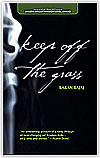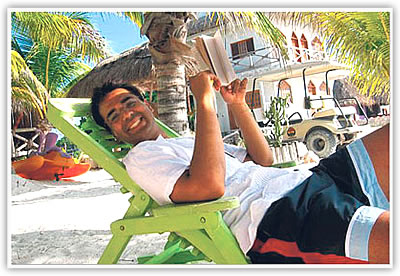| BesidesWork |  |
Home / BesidesWork /
|
|
|
 |
| Interests |
| An interview with IIM and BITs alum Karan Bajaj, author of the recent best seller Keep Off The Grass |
| Author : | thedesk |
| Institute : | |
| Posting Date : | 24/06/08 |



|
|
|
| Total 19 vote(s). |  | |
|
|
|
|
|
|
|
Keeping off the grass with Karan Bajaj
The spurt in the number of Indians writing in English, which began in the 1980s, has now turned into a torrent. One of the significant things that have happened is the increasing diversity in the genre of writing. The emerging genre of audacious and racy novels has added a dash of lemon (and spice) to the scorching curry of Indian writing. In addition the refreshing trend of professionals from premier institutes turning to writing continues to glow and sparkle.
Karan Bajaj, with his racy, bold and engaging debut novel Keep of the Grass successfully keeps you hooked to the exploits of an American Indian (ABCD to some) who leaves his plum job as an investment banker on Wall Street and flies down to Bangalore to join the IIM and experience real India. If you thought this was another campus novel or one about the angst of an Indian living abroad, you may be in for a surprise. Its not a surprise however that Keep off The Grass, with its rapid and interesting storyline has climbed up to be a bestseller in just a week of its release.

The book has typical characters - people you often bumped into or knew so well from your engineering or business school days. Our lives, we suddenly appreciate, are quite alike, familiar and funny, especially when someone narrates the story around us.
Karan wrote this book while pursuing a full-fledged corporate career. An alumnus from IIM Bangalore (2002 batch), the Aditya Birla Foundation selected him as one of the top ten young business leaders of India. Karan will join the Boston Consulting Group (BCG) in Washington D.C this September. Recently he was in India regarding the release of his book.
6bridges asked Karan about the book, his interests, the days spent at BITS Mesra and IIM (B) among other things. This is what he had to say:

Question: Congratulations on the release of your book. There has been a sudden spurt in books written by alums from IITs, IIMs, XLRI, NITs and others. Considering itís a recent phenomenon (including new ventures and pursuits by Indian professionals), do you think the Indian professional is finally mustering the confidence to break free and seek self-actualisation through writing and other innovative activities that fire his interests?
A: Yes, itís interesting you attribute this phenomenon to higher confidence/lower risk-averseness because I had a similar observation when I was in India for my book tour. Let me give you an example. Currently, I am on a six-month break between jobs and I am back-packing across Europe, South America, Bhutan, Mongolia etc. during this time. When I shared this with folks in India, their reaction was: ĎThatís awesome; how did you manage that? We want to pull it off as wellí. When I had graduated from the IIM 6 years back, I had planned on doing the same; but reactions that time were ĎHave you gone crazy? Donít try to be the American in Indiaí. So yes, I guess, people are taking more chances because they are much more confident about the economy and themselves.
Question: What was the most difficult part in writing the book? How long did it take to write? Did you ever feel like giving it up half way?
A: It took about 6 months of writing a couple of hours daily to finish; and then about three more months of post-editing. I would say editing was a bit painful since you get really attached to some portions of the book, and editors want to remove exactly those! Lots of back and forth- but all for the better in the end, as you eventually realize. No, I didnít feel like giving up half-way because I was starting to have a lot of fun writing it- fiction allows you to take some really fun leaps of fancy.
Question: In reply to a question in an interview you rightly pointed out that you and Chetan Bhagat had more differences than similarities in style and content. Do you think the genre you and Amitabha Bagchi (author of Above Average) have dealt in bears a larger resemblance to Upamanyu Chatterjeeís English August instead - especially since your protagonist has a similar tormented, rebellious streak that Upamanyuís did many years ago.
A: I think both Upamanyu Chatterjee and Amitabhaís writing is superior to mine so the comparison is very generous. I think my protagonistís jaded, laid-back protagonist is quite similar to Agastya Sen; but there is a lot more action in my novel. That doesnít mean itís better than English August; its probably a function of my inability to sustain readerís interest with just the protagonistís reflections the way Upamanyu did. I can promise the reader though that they will be equally entertained with my book!
Question: What has been your biggest learning from the efforts in writing the book?
A: That living an interesting life is one of the best things that an author can do. If you live an interesting life-backpack, hike, travel, meet interesting people, have bizarre encounters-interesting writing does follow.
Question: How much has readership changed in India now? Since you found an agent for picking up your book and marketing how easy do you feel has it become for other Indian authors to get themselves published?
A: There is lots of interest in new-age writing among publishers, but itís never easy to get published!
Question: In the 6bridges community there are professionals couched as aspiring writers, ones who havenít yet been able to make a start yet. What is your advice for them?
A: Just two thoughts. First, live an interesting life-and interesting writing will follow. Second, donít wait for a cosmic green signal to start writing; just begin and you will eventually get there.
Question: In your book, the protagonist returns to India to discover his roots. How has the experience of American born Indians informed your plot? The fatherís response is also interesting when asked about going back to India to study. How do you expect the response and interest level to be amongst them, about Keep Off the Grass?
A: I think they will be irritated with me for stereotyping them. They will definitely enjoy reading it though since its a cool book!
Question: Tell us something about your academic and professional background? What do you cherish most from your IIT and BIT (Mesra) days (We have members from those institutes in our community who would also be keen to know about this)?
A: From BIT Mesra, friendships-the first time in my life I made such strong, powerful bonds. From IIM, a lot of confidence in myself- and the importance of carving your own special place in the world versus being another rat in the race.
Question: Karan, with a full time job plus a passion of writing thatís almost full time, do you get time to pursue leisure activities like trekking, travelling and sports often? Whatís your favourite way to unwind?
A: Yes, I hike and travel a lot. Time expands to fulfil your pursuits, I guess; same way as folks carve out four hours in their day to watch cricket!
Question: How do you think 6bridges can act as a platform for young professionals?
A: By featuring my interview prominently on the home-page, ha ha!
You can check out more about Karan at karanbajaj.com
,, |
| Total 19 vote(s). |  | |
|
|
|
|
|
 | Messages/Opinions |
|
|
| | |
Click Here to login and post message
|
| Indian Alumni and Students from the following Indian and Global Institutes are invited to be members of 6bridges.com: |
| |
| India |
| Business & Accounting Institutes : FMS, ICAI, IIFT, IIM(A), IIM(B), IIM(C), IIM(I), IIM(K), IIM(L), IRMA(Anand), ISB, JBIMS, MDI(Gurgaon), NITIE, NMIMS, SJMSOM(IIT Bombay), SPJIMR, TISS, XIMB, XLRI |
| Technology Institutes : BIT(Mesra), BITS(Pilani), COE-Guindy(Anna Univ.), DCE, IISc, IIT(B), IIT(M), IIT(D), IIT(G), IIT(K), IIT(Kgp),IIT(Roorkee), ISI(Kolkatta), ISM (Dhanbad), IT-BHU, Jadavpur Univ., National Institutes of Technology(RECs), PSG(Coimbatore), RVCE(Bangalore), VJTI |
| |
| Global |
| Business, Technology & Accounting Universities/Institutes : AGSM(Sydney), AIM(Manila), Caltech, Carnegie Mellon, Columbia, Cornell, Dartmouth, Duke, Georgia Tech, Harvard, ICAEW(UK), IMD(Switzerland), INSEAD, Judge(Cambridge), London Business School, Manchester, Melbourne Business School, Michigan, MIT, Northwestern, NYU, Princeton, Purdue, Queen's(Canada), Said(Oxford), Stanford, U.Chicago, U.Penn, UC Berkeley, UCLA, Univ. of Illinois-Urbana, Univ. of Southern California, Univ. of Virginia, Warwick, Yale |
|
|























